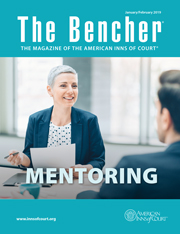Five Easy Ways to Get the Most Out of Mentorship at Small-Group Meetings
The Bencher—January/February 2019
By Cassandra R. Malone, Esquire and Julianna T. Hopper, Esquire
 One of the most beneficial aspects of the American Inns of Court is the mentorship opportunities. We belong to the H. Vearle Payne American Inn of Court in Albuquerque, New Mexico, which meets once a month in a large group. Our smaller groups meet separately each month. To get the most out of the mentorship opportunities in the small-group meetings, there are five easy steps that everyone—both newer and more experienced attorneys—can take. Following these steps can have a big impact on your overall experience with mentorship at the small-group meetings:
One of the most beneficial aspects of the American Inns of Court is the mentorship opportunities. We belong to the H. Vearle Payne American Inn of Court in Albuquerque, New Mexico, which meets once a month in a large group. Our smaller groups meet separately each month. To get the most out of the mentorship opportunities in the small-group meetings, there are five easy steps that everyone—both newer and more experienced attorneys—can take. Following these steps can have a big impact on your overall experience with mentorship at the small-group meetings:
Show up. One of the most important things everyone can do is also one of the most basic: show up. This is the best and easiest way to get to know your fellow members and participate in the mentorship aspect. It’s also a matter of courtesy. It can be incredibly frustrating to a group when people do not show up or consistently show up late. Everyone understands that attorneys have numerous and competing time constraints. But if everyone in your small group is not committed to showing up on a regular basis it makes it harder and harder for the group to meet throughout the year. This in turn weakens the mentorship opportunities and defeats one of the primary benefits of belonging to the American Inns of Court.
If the time commitment is too difficult it is best to address this head-on, particularly by the person who cannot make it to meetings. It is always better to contact the group and let the members know you cannot attend. This can then be dealt with, maybe by moving the meetings to a more convenient time. It can also be a mentorship topic of discussion, in which the group can discuss how to balance competing time commitments. It is better to deal with this because absences without explanation don’t go unnoticed, even if your group is kind and members do not mention it.
Participate. One of the requirements in our local Inn is for the young attorneys to bring topics and questions to the small-group meetings. However, we have found that young attorneys sometimes find this idea overwhelming. If you do feel overwhelmed, remember that your questions can be broad and you can simply ask the more experienced attorneys if there is anything they wish they had asked when they were younger.
More experienced attorneys should also not place the burden on younger attorneys to come up with topics and questions. If your group is having trouble coming up with something to discuss, talk about an interesting case you have worked on. We always appreciate when other attorneys tell us how they have handled situations because that helps us learn how to handle those same types of situations if they arise.
Look for peer-to-peer mentorship opportunities. Much of the focus at our small-group meetings is typically on the mentor-mentee relationship, which we agree is invaluable. However, Inns also provide an excellent opportunity for peer-to-peer mentorship. For example, if a young attorney asks a general question about how to deal with difficult opposing counsel, it can be useful to hear that other young attorneys have the same concerns, even if they do not have the answers. And then, of course, the more experienced attorneys can provide guidance.
Be professional. Everyone should always behave professionally and respectfully. Young attorneys in particular should also remember that one of the many purposes of the American Inns of Court is to provide an opportunity for networking. The groups consist of attorneys and judges practicing in many areas of law. By being professional, courteous, and making a good impression, opportunities can arise, sometimes even employment opportunities. In fact, we have met several people who are in their current positions because of contacts made through the Inn.
Have fun. This should be obvious, but a reminder can be helpful. The mentor-mentee relationship is beneficial for learning and career-building, but it should also be fun. It is an opportunity to meet people with whom you might otherwise not have an opportunity to interact and have discussions with in a non-office setting. We encourage everyone to remember this and enjoy themselves.
Cassandra R. Malone, Esquire and Julianna T. Hopper, Esquire are members of the H. Vearle Payne American Inn of Court, in Albuquerque, New Mexico. Malone is of counsel at the law firm of Brownstein Hyatt Farber Schreck, LLP and Hopper’s mentor through the New Mexico Bar Association Bridge the Gap Mentorship Program. Hopper is an associate at the law firm of Keleher & McLeod, P.A.